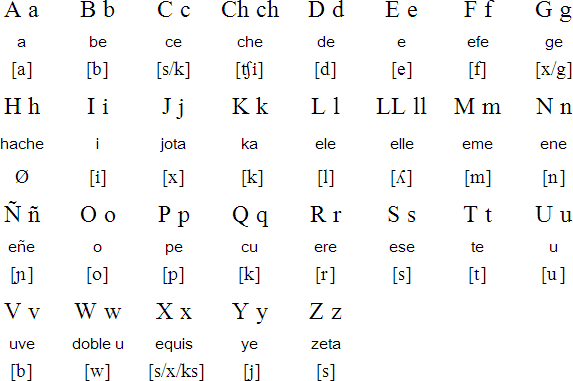Chavacano
Chavacano or Philippine Creole Spanish is a Spanish-based creole language spoken
in parts of the Philippines, especially in and around the city of Zamboanga, by over
600,000 people. There are also speakers of the Zamboanga dialect of Chavacano in
Sempornah, Malaysia. It is the only Spanish-based creole in Asia and the only non-Austronesian
language to have developed in the Philippines.
Chavacano combines vocabulary mainly from Spanish, with grammar mainly from Tagalog
and Cebuano. There are two main varities of Chavacano in Zamboanga – a formal variety that
contains more Spanish vocabulary, and an informal variety containing more vocabulary from
Tagalog, Cebuano and other Philippine languages.
Chavacano is used primarily as a spoken language which dates back to 1635, when Zamboanga
became a permanent Spanish stronghold with the construction of the San José Fortress.
Recently a standard written form has began to emerge.
As a general orthographic rule, all words of Spanish/European and Mexican origin are
spelt according to their original spelling in the Spanish alphabet. Words from Philippine
languages are spelt in the native way along Spanish rules. For example: jendeh,
meaning no or not, is not spelled as hinde because h is always silent in the
Spanish alphabet, thus it is not spelled as in Tagalog.
There are six dialects of Chavacano, each with a number of different names:
- Zamboanga dialect (about 360,000 speakers): Zamboangueño, Chavacano/Chabacano/Chabakano de Zamboanga
- Cavite dialect (about 200,000 speakers): Caviteño, Chavacano/Chabacano/Chabakano de Cavite, Caviten, Linguaje di Niso, Tsabakano
- Ermita dialect: Ermiteño or Ermitaño (practically extinct)
- Ternate dialect (about 7,000 speakers): Ternateño Chabacano, Bahra, Linguaje di Bahra.
- Davao dialect (about 18,000 speakers): Davaoeño, Davaweño, Davawenyo, Davawenyo Zamboangenyo, Abakay Spanish, Davao Chabacano/Chavacano/Chabakano.
- Cotabato dialect (about 20,500 speakers): Cotabateño, Cotabato Chabacano/Chavacano/Chabakano.
Chavacano alphabet and pronunciation (Zamboanga dialect)

Notes
- C = [s] when followed by e or i, and [k] when followed by a, o or u
- G = [x] when followed by e or i, and [g] when followed by a, o or u
Sample text in Chabacano de Zamboanga
Todo’l maga ser humano nace libre e igual en dignidad y maga derecho. Dotado
con ellos el razon y conciencia y debe ellos comporta fraternalmente con el maga
uno con el maga otro.
Listen to this text
Sample text in Chabacano de Cavite
Todo el mga genti ya naci libre y igual na dignidad y derecho. Tieni ilos
rason y conciencia y debi ilos trata cun uno y otro comu mga hermano.
Translation
All human beings are born free and equal in dignity and rights. They
are endowed with reason and conscience and should act towards one another
in a spirit of brotherhood.
(Article 1 of the Universal Declaration of Human Rights)
Lord’s Prayer in Common Chavacano of Zamboanga
Tata de amon talli na cielo,
bendito el de Usted nombre.
Manda vene con el de Usted reino;
Hace el de Usted voluntad aqui na tierra,
igual como alli na cielo.
Dale kanamon el pan para cada dia.
Perdona el de amon maga culpa,
como ta perdona kame con aquellos
quien tiene culpa kanamon.
No deja que hay cae kame na tentacion
y libra kanamon na mal.
Lord’s Prayer in Formal Chavacano of Zamboanga
Nuestro Tata talli na cielo,
bendito el de Usted nombre.
Manda vene con el de Usted reino;
Hace el de Usted voluntad aqui na tierra,
igual como alli na cielo.
Dale con nosotros el pan para cada dia.
Perdona el de nuestro maga culpa,
como nosotros ta perdona con aquellos
quien tiene culpa con nosotros.
No deja que nosotros hay cae na tentacion
y libra con nosotros de mal.
Philippine National Anthem (Chavacano de Zamboanga version)
PATRIA DE AMORES
Tierra adorada,
Hija del sol de oriente,
Fervor del corazon,
viví na tuyo pecho.
Patria de Amores,
Cuna del heroísmo,
Nunca hay rendí tú
al mana invasor.
Na tuyo mar y mana monte,
y aire, y azul cielo,
Tiene esplende el poema y canción
del amado libertad.
Victoria árde el chispa
de tuyo bandera.
Nunca mirá apagáo
Su mana estrella y su sol
Tierra de gloria, del sol y amores,
vida dulce na tuyo abrazáda,
Un honor se para con nosotros,
Cuando tiene opresor, morí por tú.
